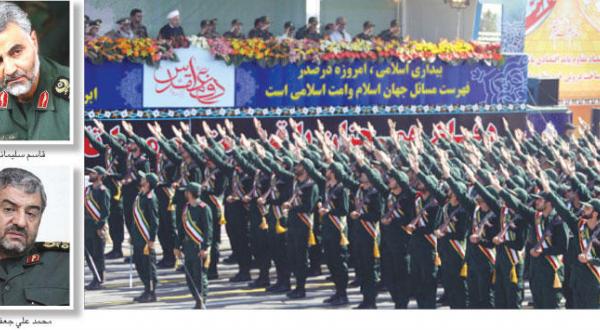
Part of a previous Revolutionary Guard military parade attended by the Iranian President and military leaders (AFP)
The comments made by the Chief Commander of Iran’s Revolutionary Guards Mohammad Ali Jafari about the training of around 200,000 fighters in Syria, Iraq, Yemen, Pakistan and Afghanistan sparked Arab and regional disapproval.
The spokesman for the Yemeni government Rajeh Badi told Asharq Al-Awsat that the statement made by Jafari is considered “direct aggression against Yemen and a violation of its sovereignty”. He also stressed that the Yemeni government is determined to call on the United Nations and international institutions to “intervene in order to stop this tyrannical aggression”.
The President of the National Coalition for Syrian Revolutionary and Opposition Forces Khaled Khoja told Asharq Al-Awsat that Jafari’s statement “shows that Iran is no longer cautious of speaking about its negative role in the region” and added that Iranian militias in Syria alone amount to around 50,000 fighters without counting Lebanese Hezbollah fighters. He stressed upon the need to address Iranian intervention with “firmness and force by Arab countries”.
In Pakistan, tribal sources in the region of Bara Tashnar which borders Afghanistan said that it has become a supply base formed of Shiite fighters from Pakistan for the so-called “Zainbion” brigade that fights alongside the regime in Syria. The minister of the Afghan border confirmed that 20 Afghan young men are killed weekly on the border with Iran in an attempt to leave Afghanistan to seek refuge in European countries. He also confirmed that the Revolutionary Guards want to recruit these men to fight in Syria under the banner of the “Fatimiyoun” brigade. Pakistani and Afghan sources told Asharq Al-Awsat that the Iranian authorities pay every Shi’i Pakistani or Afghan fighter approximately 120,000 Pakistani rupees ($1,200) per month and this is what motivates a number of them to join the “Fatimiyoun” and “Zainbion” brigades.
In a related development, Hamas has decided on its position with regards to the recent Iranian offer which includes the normalisation of relations and financial support in exchange for the movement’s support of the Iranian confrontation of Saudi Arabia and refused the offer by not expressing an opinion.
The Comoros announced the severing of diplomatic relations with Iran because of its “lack of respect for Vienna conventions” in reference to the recent Iranian attacks on the Saudi embassy in Tehran and its consulate in Mashhad. In doing so, the Comoros became the sixth country to sever ties with Tehran after Saudi Arabia, Bahrain, Sudan, Djibouti and Somalia did so.
